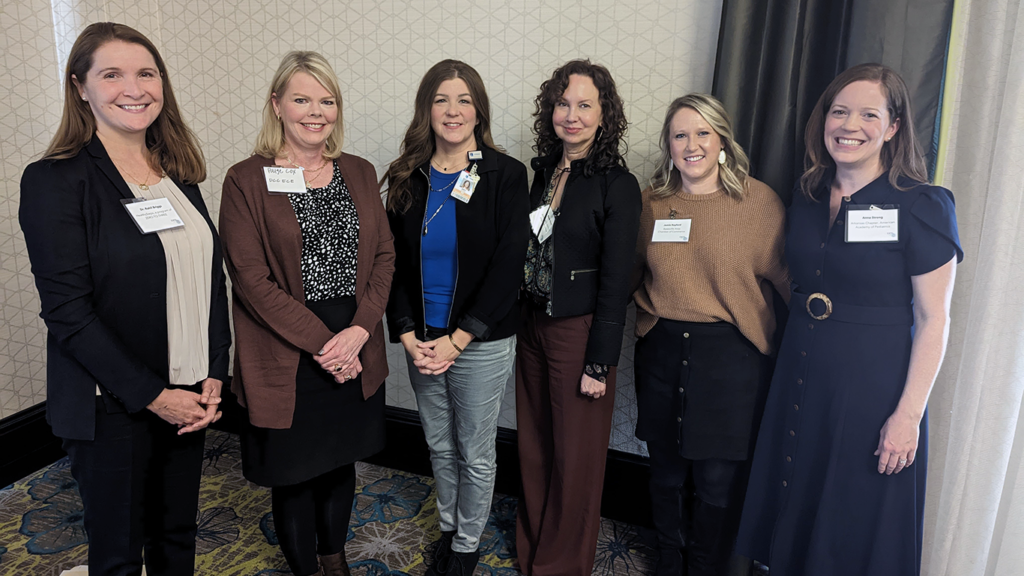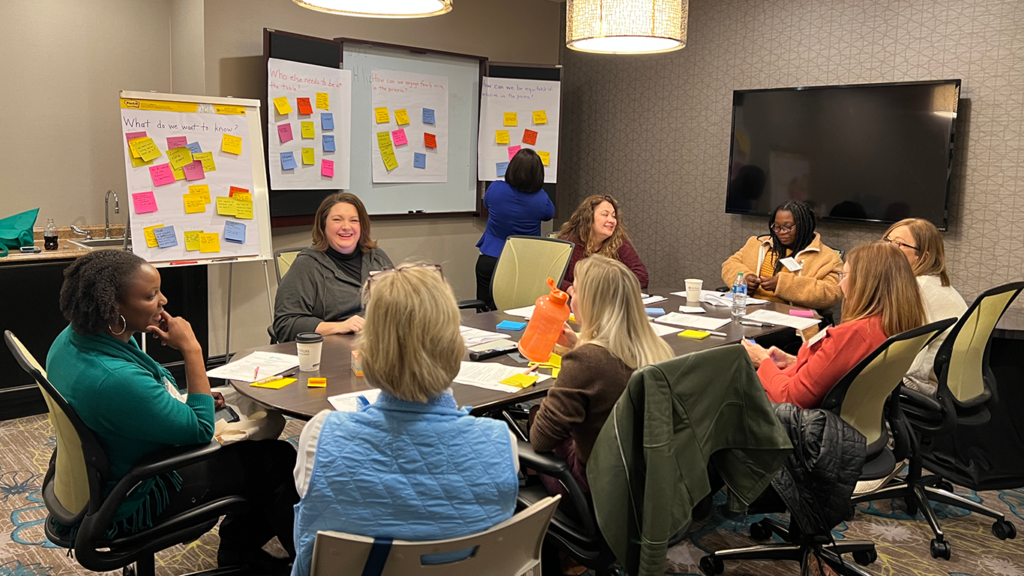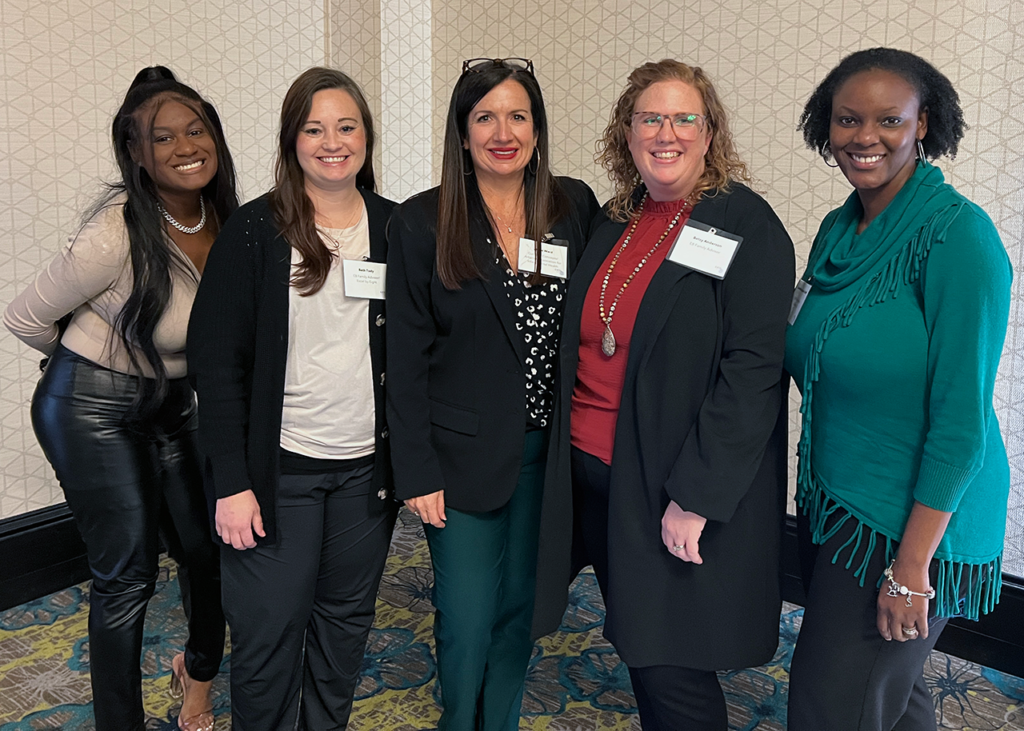Last month, the Excel by Eight Foundations Collaborative gathered in Little Rock with stakeholders and partners for a Summit to celebrate early successes for our policy agenda and begin setting our agenda for the next several years.
Through informative panels and engaging breakout sessions, participants discussed needs and brainstormed possible solutions and strategies for addressing priority policy areas. They also heard from parents about their lived experiences with early childhood systems, the policy challenges they have faced, and their engagement in the policy process.
Here are our top eight takeaways from the Summit:
1. Child care expands in Arkansas.
More than 8,500 additional children will have access to child care thanks to funding from the American Rescue Plan Act (ARPA) expansion grant.
During a panel discussion on successes and future directions for early childhood development, Paige Cox from the Division of Child Care and Early Childhood Education (DCCECE) of the Arkansas Department of Human Services (DHS) shared that the division received 150 applications from child care providers across the state for expansion grant funding through ARPA. An additional 58 providers received a competitive Child Care Supply Building Grant. The breakdown by age of the 8,572 additional children served through funding from both grants follows:
- 2,184 additional infants
- 2,791 additional toddlers
- 3,478 school agers
- 119 additional in-home slots added for in-home care
2. T.E.A.C.H. program enrollment soars.
The T.E.A.C.H. Early Childhood® Arkansas Scholarship Program was developed to upgrade the level of education of teachers working with young children while making the educational process affordable, increasing wages and reducing turnover. DCCECE committed an additional $40 million of ARPA funds for T.E.A.C.H. and its companion program, Step Up to WAGE$ Arkansas. During the fall semester of 2022, 258 early childhood educators were enrolled in the program. This level of participation represents more than a 400 percent increase from July 2021.

3. More needs to be done to support early childhood education.
Despite recent successes, the Arkansas Early Childhood Education Task Force – a coalition of executives representing chambers of commerce, economic development organizations, and philanthropic groups – has identified gaps in the early childhood education system related to access to care, workforce, and quality of care:
- Existing funding meets the needs of only about half of low-income families.
- Early childhood educators make between $16,500 and $23,000 less than kindergarten teachers.
- Only 15% of working parents can find high quality care for their infants and toddlers.
Jamie Rayford of the Batesville Area Chamber of Commerce outlined three recommendations from the task force:
- Support the establishment and expansion of quality child care.
- Recognize adequate compensation is critical for early childhood educators.
- Make child care affordable.
4. Arkansas is in a “preferred” category for HealthySteps expansion.
Arkansas is in a “preferred” category for HealthySteps expansion. The medical system – pediatricians, family medicine doctors, nurse practitioners, and other health professionals who deliver well-child checks for children – is a universal way to reach all families. Dr. Rahil Briggs, national director of HealthySteps, talked about HealthySteps’ role in partnering with pediatric offices across the U.S. to provide early childhood development support to families.
HealthySteps has 225 practices reaching more than 350,000 children in 25 states and Washington D.C., including seven practices in Arkansas. HealthySteps’ national goal is to reach one million children by 2032. Arkansas is a preferred state for HealthySteps, meaning the program is prioritizing bringing new sites on board, promoting program sustainability beyond philanthropic investment, and making sure the program reaches even more children and families across the state.
“We have a great problem of more sites wanting to be HealthySteps than we can handle, so we’ve really had to prioritize,” said Dr. Briggs. “Arkansas is in a preferred category for us for lots of reasons. Part of it is this partnership between the public, private, and nonprofit sectors. It’s at the state level where policy change happens – having the right people in the room to work together on how we can get prevention and promotion paid for.”

5. Screenings for maternal depression in pediatric clinics help mothers and families get the support they need.
Screenings for maternal depression in pediatric clinics help mothers and families get the support they need. The Arkansas Children’s Care Network (ACCN) and the Arkansas Chapter of the American Academy of Pediatrics, with the support of the Blue & You Foundation and Walmart Foundation, are partnering to implement a demonstration of HealthySteps in Arkansas. Seven pediatric clinics in Arkansas currently have HealthySteps Specialists on-site: Best Start Pediatrics (Springdale), Harvey Pediatrics Operated by Arkansas Children’s (Rogers), Hot Springs Pediatric Clinic, Pediatric Partners (Fort Smith), the Circle of Friends Clinic at Arkansas Children’s Hospital (Little Rock), The Children’s Clinic of Jonesboro, and Little Rock Pediatric Clinic.
Amy Stephenson of ACCN emphasized that HealthySteps is not just about the child but the family unit as a whole. One of the eight core components of HealthySteps is screening for family needs, which includes maternal depression, social determinants of health, and other risk factors. In a striking statistic from one HealthySteps site that began screening for maternal depression this July, 92% of mothers screened were positive for the condition. The HealthySteps Specialist provided resources to the mothers to help them address their mental health.
6. DHS officials urge lawmakers to expand behavioral and mental health services.
Arkansas Medicaid provides health coverage for more than half of the child population in Arkansas. At this time, the main focus of behavioral health services covered by Medicaid is diagnosis and treatment rather than prevention and early intervention. Paula Stone from the Division of Medical Services of the Arkansas Department of Human Services shared that DHS is working with lawmakers to change the state’s Medicaid manuals and update billing codes to make it easier for people with behavioral health problems to get access to screenings and treatment. Read more about the proposed changes in the Arkansas Democrat-Gazette.
7. Stories from family leaders underscore the real-world impact of policy on people’s lives.
During a panel on family experience, Excel by Eight family advisors Betsy Anderson, Ashley Henry, Cemeka Agugbuem Smith, and Beth Tody spoke passionately about the impacts that policy has on families navigating the early care and education system. They shared personal experiences about the challenges of finding high-quality child care, the benefits of home visiting programs and familial support, and the importance of early intervention. “We have to hear people’s stories,” said Agugbuem Smith to the room of educators, policymakers, and health professionals. “Don’t take the humanity out of what you do.”

8. Lawmakers explore ways to improve health and education outcomes for children in Arkansas.
The closing panel on legislative perspectives featured Rep. Denise Garner, Sen. Missy Irvin, Rep. Julie Mayberry, and Rep. Aaron Pilkington. Each of the lawmakers have been advocates for health and education for young children and touched on the importance of prevention and early intervention through screenings and home visiting programs as well as early childhood education. “This is an economic issue,” said Rep. Pilkington. “We’ve accidentally created a society that makes it hard to have children.”
